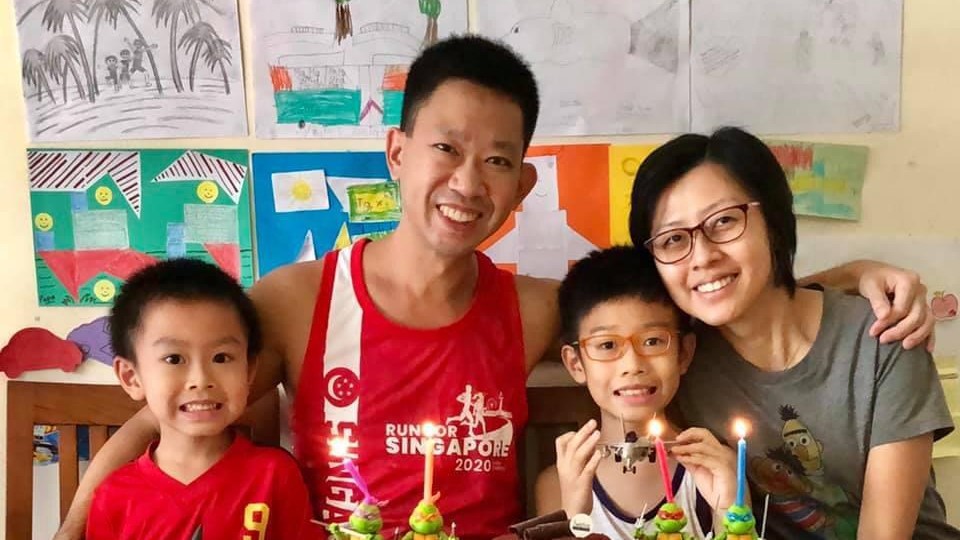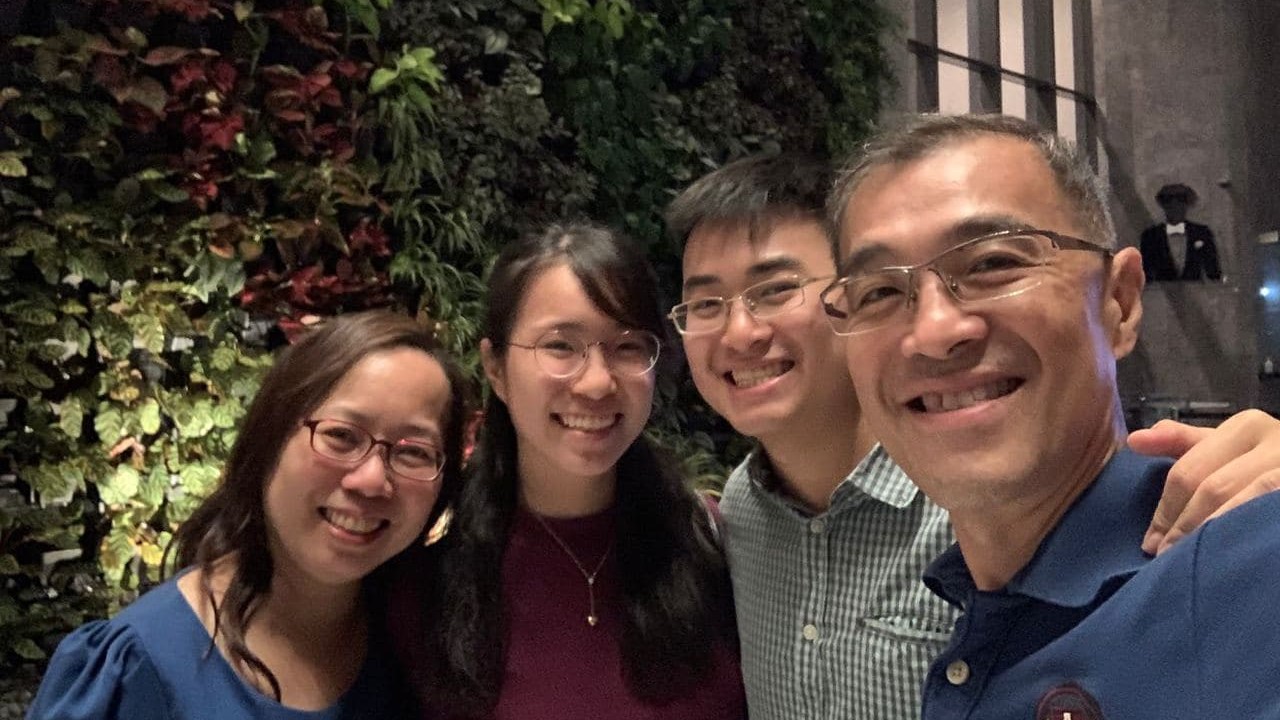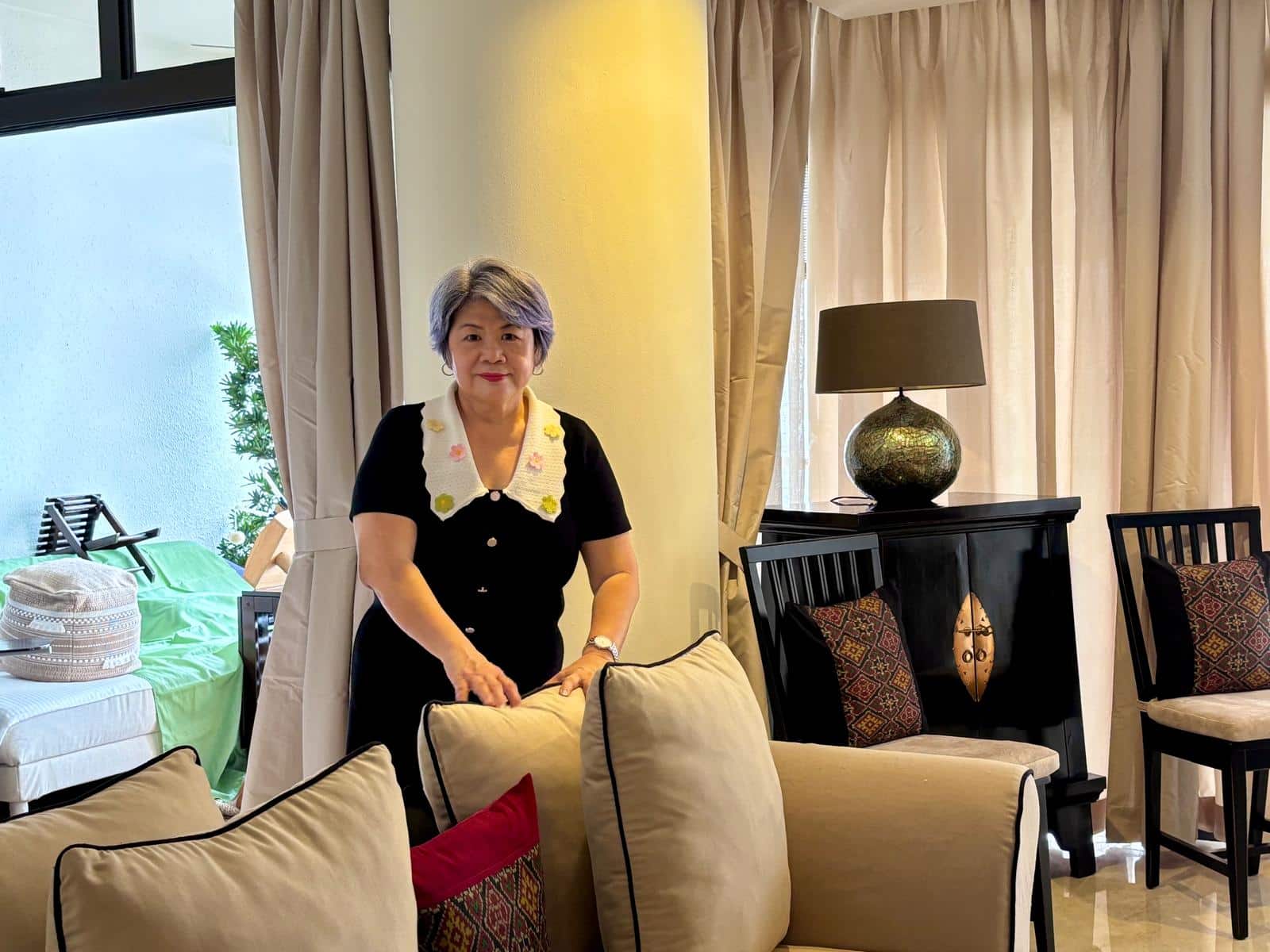How do we manage family finances in a way that pleases God?
by Christine Leow // November 20, 2020, 6:31 pm

The Sum family – Josiah, Matthew, Joash and Rebecca – believe that living simply is one way of being good stewards of God's money. Photo courtesy of the Sum family.
Like children are wont to do, Joash and his younger brother Josiah sometimes complain about what is on the family meal plan.
Said mum, Rebecca Seow, 38: “Sometimes, when you cook for them, they don’t eat it or they want something else. So, I tell them, ‘What you have at the table I have to earn to provide.’”
Being creative and “financially literate”, Rebecca and her husband Mathew Sum, 39, came up with a fun way to help their boys both appreciate the meals set before them and understand the value of money.
They gave the eight- and five-year-olds $10 and set them free at a supermarket with one instruction: Plan your own dinner menu.
Explained Rebecca on her Facebook page: My intention was to let them have a taste of sourcing for ingredients and being mindful about what constitutes a meal. It was also about time and money management.

The Sum brothers were given $10 to plan their dinner menu as part of their parents’ effort to teach them the value of money. Photo from Rebecca Seow’s Facebook.
So, how did the boys do?
“Our family’s view of money is that it is something that God has blessed us with.”
“They got very tense. They tried to look out for discounts and started comparing brands. But they kept within the $10,” said Rebecca with a laugh.
Dinner that day was noodles with fishballs and a dessert of freshly cut mangoes and non-fat yoghurt – kid-friendly yet well-balanced.
“And they finished everything,” she said.
Through that shopping expedition, the Sum siblings learnt just how much $10 could buy them, and their parents saw the boys put into practise cost-saving measures they had often discussed.

The Sum brothers were able to meet their budget and they enjoyed the meal they picked for themselves. Photo from Rebecca Seow’s Facebook.
“Our family’s view of money is that it is something that God has blessed us with and we work hard with the gifts and talents He has given us to earn it,” said Rebecca.
Salt&Light talks to parents for tips on how to teach children about God’s financial provision.
1. As a couple, agree early about money matters
While the Sums were still dating, they had already talked about how they would manage the family finances. In keeping with their shared view of money, they decided that they would be prudent and would live simply – no cars, no fancy homes, no domestic helper.
“Give me a dollar and I would save it, not spend it.”
“We are used to it. Our parents didn’t have cars. All our lives we have used public transport.
“We didn’t take cabs unnecessarily. My parents lived in a four-room flat all their lives – one home for a lifetime,” said Rebecca.
So, they made it a point to live near an MRT station and to “settle our bills as soon as we receive them” so they would not be in debt.
Retired accountants Daniel Loo, 64, and his wife Hoi Loon, 62, started their married life 32 years ago also in agreement about their finances.

Daniel Loo and his wife Hoi Loon taught their children Jodie and Deborah from young that the money they have was given by God. Photo courtesy of the Loo family.
“We agreed that when the children came, I would stop work. That was what I wanted to do. So, we planned our finances around one income,” said Hoi Loon.
“We planned our finances around one income.”
It was easier for the couple also because they were raised to live simply.
Said Daniel: “I’m not the kind to splurge. Give me a dollar and I would save it, not spend it. My parents taught me to save. With six children on a single income back then, we had to live simply.”
Hoi Loon, too, came from a modest background.
She lost her father at age seven and her mother had to take on several jobs to raise her and her three siblings.
2. Talk about money as a family
The Sums are open about their family’s financial situation. The Circuit Breaker affected Rebecca’s work as a Math tutor. Even though she switched to online lessons and lowered her fees, she still lost some students.
“At the dinner table, we talk and I tell the children about why we had to tighten our belts on ‘wants’ because of my job uncertainty as well as greater expenses from electricity bills and groceries because everyone is home more.
“We talk about the gains … You don’t lose out when you don’t have all these.”
“I do tell them about our purchases – how much we spend every month, why I buy this item rather than that. We share with them why and how we make responsible decisions about money. That has helped them gain a better perspective towards stewardship of money,” said Seow.
When the children ask why others have ”someone to clean for them but I have to do everything” or envy those with larger, nicer homes, the Sums take the time to explain.
Said Matthew: “We talk about the gains. We tell them, ‘Yes, no doubt an auntie may help you but do you think you would have learnt the skill of washing your own plates? Without a car, you learn to travel on your own. You don’t lose out when you don’t have all these.’”
3. Kids are never too young to learn
The Loos’ two daughters are now 25 and 27. From the time they were children, they have been taught the concept of “stewardship of money” – that the money they have comes from God and they have to use it wisely.
“We tell them to learn to live within their means, not to borrow to sustain a lifestyle and not to be in debt. We’ve always believed in the biblical principle of Proverbs 22:26-27,” said Daniel.
So, while the Loos could well afford many of the finer things in life, unlike Daniel and Hoi Loon’s own parents, they never indulged. Their daughters never asked either.
“Our younger one will wear a pair of shoes till the thread is bare.”
“Probably because they knew that daddy would say no!” said Daniel.
Instead, the girls were “encouraged to tithe”.
“The hope was that this practice would stay with them as they grow up,” said Daniel.
Some of the things the Loos have been teaching their daughters have stuck. Their older daughter, Deborah, will not spend on things that are “not worth it”.
“She will never order noodles at those Hong Kong cafés because she says they are basically instant noodles and a waste of money.
“Our younger one will wear a pair of shoes till the thread is bare and I have to convince her to buy new ones,” said Hoi Loon.
The Leongs, Weng Kwan and Mona, also taught their children financial responsibility from young. When the kids were little, they gave their son and daughter two containers – one for saving, one for giving. This was their way of placing equal emphasis on both.

Mona (left) and her husband, Leong Weng Kwan (far right), taught the children to give from a young age. Today, their children Timothy and Terynn are generous givers. Photo courtesy of the Leong family.
“Today, they practise something called a faith promise. They pledge a certain amount by faith, and sometimes the amount is more than what they really have, and trust God for it,” explained Mona, 51.
“I often reiterate that God looks at the heart of giving and we need to be generous givers, not calculative.”
The year their daughter Terynn turned 12, she pledged an amount to the church building fund. It was more than what she had. But that year, she won three Ministry of Education awards. “She gave the money from the awards. It was more than what she had pledged to give.”
Their son, Timothy, also gives generously. He supports Youth for Christ full-time workers with his allowance.
For the Sums, even before the children have an allowance, the concept of tithing is introduced.
“So, for our younger child who is not receiving an allowance, I give him a fifty-cent coin each week to drop into the offering bag and tell him that mummy is giving her offering through him,” said Rebecca.
“He is aware that he will need to give an offering to God when he receives an allowance. I would often reiterate that God looks at the heart of giving and we need to be generous givers, not calculative or stingy.”
4. Teach practical stewardship
As part of teaching stewardship of money, the Loos have an agreement with their daughters – for big ticket items, the girls would pay half the cost. So, when it came time for them to take driving lessons, they took care of half the bill.
By saving up for the items they want to buy, the Sum children take more ownership.
“Then, they will know the value of it and not take their time getting their driver’s licence,” explained Daniel.
When their younger daughter, Jodie, wanted to go on a school exchange programme while in university, the same 50-50 model applied.
Being accountants, the Loos also impart their financial skills to their children. Apart from emphasising saving, Daniel had already taught them investment know-how and budget planning from their junior college days.
For the Sums, instead of acceding to requests for toys, they encourage their children to save up for things that they really want so they have “ownership of the items they buy”.
One such item was a Beyblade and a launcher which cost a princely sum, to the children, of $41. They saved for months in order to get it.
5. Model behaviour
The Sums model frugality by living with less-than-perfect items.
“I would mend their buttons that have fallen off their uniforms, or get them to scrub their soiled shoes. These actions nurture in them (the importance) of taking responsibility for their belongings and not treating them as items to be easily replaced at the slightest flaw,” said Rebecca.
“I tell them, ‘Open your heart to help.’”
“Recycling and reusing is part and parcel of our family culture and this stirs creativity with what we have rather than stirring up material gains.”
Once, their elder son’s pencil case had a large hole in it that looked too difficult to mend. Rebecca offered to get him a new one but he insisted on patching the hole instead.
“After I did, he was so glad and beaming with joy. The contentment on his face spoke volumes to me.”
They openly give to buskers and also to the homeless when they see them in other countries.
“No explanation is needed. We allow the actions to speak for themselves. Our children pick it up and have approached buskers in the streets to support them with their savings,” said Rebecca.
On more than one occasion, the Loos have loaned to those in need in the church.
Said Daniel: “I tell them about these incidents and teach them to help others and people in genuine need. I tell them, ‘Open your heart to help.’”
6. Teach contentment to combat envy
For the Leongs, living simply was how they taught their children to be contented.
“My husband is quite simple and I don’t need much,” said Mona.
When their son went into the army, most of his army mates had 50GB of data but he had only 3GB. “He struggled a lot but he never asked for more. He simply lived with it.”
Said Rebecca: “We often share about what we are thankful for. That gives rise to a grateful heart.”
Salt&Light Family Night: How do we manage money God's way?
How should Christians view money? How can families teach their children about tithing, giving and saving? Should Christians be rich? How can we master the art of living simply?
Joining our hosts Carol Loi and Alex Tee to discuss these issues are guests:
- Pastor Benny Ho
Senior Pastor of Faith Community Church in Perth, Western Australia, and author of Managing Money God’s Way
- Dr Tan Lai Yong
Missionary doctor and lecturer at the National University of Singapore who lives simply
- Abel Ang
CEO of Advanced MedTech who bucked the trend and chose to live in an HDB flat
Date: Tuesday, November 24, 2020
Time: 8.30pm-10pm
Cost: Free
Register at: https://bit.ly/SLFamilyNight24Nov
Banking head honcho now works with villagers and ex-convicts
It’s non-negotiable: “Money does matter, but God matters more”
We are an independent, non-profit organisation that relies on the generosity of our readers, such as yourself, to continue serving the kingdom. Every dollar donated goes directly back into our editorial coverage.
Would you consider partnering with us in our kingdom work by supporting us financially, either as a one-off donation, or a recurring pledge?
Support Salt&Light


